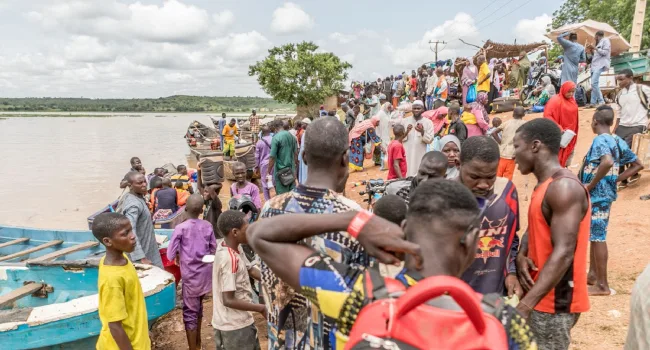Nearly two years after Niger’s military seized power and shut its border with Benin, tensions over regional security, sovereignty, and French influence have hardened into a prolonged stand-off that is crippling cross-border trade and paralyzing diplomatic relations between the two West African nations.
Benin, which firmly denies hosting foreign forces accused of destabilizing Niger, says it has made multiple diplomatic overtures to ease the blockade. But despite mounting economic pressure on both sides of the border, efforts at reconciliation have so far failed.
“The people of both countries are the ones suffering,” said Nigerien haulier Ibrahim Abou Koura, who is based in Cotonou, Benin’s economic capital.
Niger’s military leader, General Abdourahamane Tiani, has repeatedly accused Benin of harboring French military personnel allegedly training jihadist groups to undermine Niger. In May, Tiani declared the border would “remain closed,” insisting that Niger’s quarrel is not with Benin, but with French forces he claims are operating from its territory.
The fallout from the coup and subsequent border closure has dealt a severe blow to trade and mobility between the neighboring nations.
“Buses aren’t full anymore. The flow of people just isn’t the same,” Abou Koura said from his now-deserted goods depot in Zongo, once a hub for freight bound for major Nigerien cities.
Still, some movement persists despite the official closure. According to transport workers in Cotonou, the Niger River — which forms a natural boundary — remains a vital crossing point.
“Goods pass, and people cross the river to continue their journey by bus on the Niger side,” said Alassane Amidou, a resident of Malanville, a border town in northeastern Benin.
But for freight trucks unable to use the river, alternative routes through jihadist-infested areas of Burkina Faso are both dangerous and costly.
“The Niger-Benin corridor is currently the safest, shortest, and most profitable route for transporters and businesses,” said Gamatie Mahamadou, secretary-general of a Nigerien truckers’ union consortium in Niamey. He urged Niger’s military leaders to “immediately normalize relations with Benin,” warning that national economic interests and worker safety were being put at risk.
Signs of cautious optimism
In a positive step, Niger’s critical oil exports to Benin’s Seme-Kpodji port resumed via a cross-border pipeline in late 2024 after months of disruption. However, uranium shipments from northern Niger remain halted, pending either a diplomatic breakthrough or the establishment of alternative export routes.
Benin, for its part, continues to deny allegations that it is complicit in any foreign-backed efforts to destabilize Niger. It has consistently extended diplomatic olive branches in a bid to restore relations.
Former Beninese presidents Thomas Boni Yayi and Nicéphore Soglo visited Niamey a year ago in a failed attempt to initiate dialogue with General Tiani.
Earlier this month, Benin’s Foreign Minister, Olushegun Adjadi Bakari, expressed hope for progress, stating that “prospects for recovery” remain, provided security concerns are addressed.
“We remain hopeful that this situation will be resolved soon. The blockage is not from Benin’s side,” Bakari told local media. “We must accept that we may not always see eye to eye… But the door remains open.”
There are signs of potential diplomatic thaw: a new Beninese ambassador may soon be appointed to Niamey, following the quiet recall of Gildas Agonkan in February. Agonkan had issued a rare public apology “on behalf of all Beninese and the authorities of Benin” to the Nigerien people.
“The apology was seen in Cotonou as a diplomatic concession during a sensitive moment in the crisis,” said Guillaume Moumouni, an international relations analyst. “The next ambassador must be someone with high credibility and a deep understanding of Niger to rebuild trust.”
Security risks and diplomatic isolation
As Benin continues to face a surge in jihadist attacks in its northern regions, officials lament the lack of cooperation with Sahel neighbors now governed by military regimes.
“Not being able to coordinate directly with its neighbors increases Benin’s vulnerability,” warned Lassina Diarra, head of the Strategic Research Institute at the International Counter-Terrorism Academy in Côte d’Ivoire.
With presidential elections scheduled for April 2026 in Benin, analysts suggest that political change could offer a fresh opportunity to restart “serious negotiations” between the two countries.
AFP


